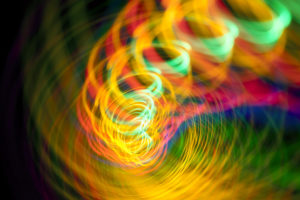
Toti O’Brien
Choices
You watch memory uncoil and rise
like a spire of smoke, camphor-scented
a curtain in reverse lifting upwards
from the carpet, systematical, quiet
then suddenly but not unexpectedly
(you have witnessed this before
oh so many times) veering to the right
to the left in an awkward curve
harpoon-shaped. A strange twist
as if to avoid an invisible obstacle
as if squeezed by an abrupt fit of pain
distraught by a nasty afterthought.
The same motion always, right, left
two sharp angles and then memory
sways, curls like a hooked index
finger trying to reach secret something
a scrap, a small bead, a safety pin stuck
in a remote corner. But the attempt aborts.
The plume of smoke deflates and then falls.
You believe you hear a voice faintly
spelling the name of a town, but it shifts
from San Francisco on a rainy spring
afternoon to the outskirts of Naples
where a factory births statuettes of rosy-
cheeked peasants, to that other town
on a hilltop where a nuclear plant
slowly leaks its cancerous waste.
Something was lost, you suspect
in one of those towns, precious
like the elixir of long life or the Golden
Rule that is, in fact, a ruler, the cape
that makes you invisible, the formula
for time traveling, the universal pardon
or peace. Peace, you think. Memory
hesitates, suspended like a finger
above a keyboard in the tensed silence
of a crowded concert hall, the crack
between two notes like the toothy grin
of a shark, like the edge
of a precipice.
______________
Toti O’Brien is the Italian Accordionist with the Irish Last Name. Born in Rome, living in Los Angeles, she is an artist, musician and dancer. She is also the author of Other Maidens (BlazeVOX, 2020), and An Alphabet of Birds (Moonrise Press, 2020).
Author’s Comments: “Choices” is a meditation on the complexity of memory, on the tentative nature of our reconstruction of the past. Memory represented as meandering smoke to me evokes the neural impulse, proceeding through paths, “choosing” at each synaptic joint this or that direction, therefore connecting dots in different manners, ultimately birthing different interpretations of reality, history, and life. The meandering also reflects the brain, its labyrinthine nature, as well as it evokes topography, a map, as if time and space overlapped. “Choices” seems to imply there might be a path of remembrance preferable to another one; that there might a truth and finding it might be crucial, maybe allow to correct past errors. But it is a difficult task.
Editor’s Notes: The abstract elusiveness of memory, and Toti’s attempts to concretize it, might be mapped onto this abstract digital art of a light painting has similar concrete elements (christmasstockimages.com).
